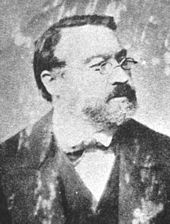Ernest Trumpp
[5] One of his controversial works was based on an 8-year study of the Sikh scriptures, where he attempted to philologically analyze and translate a significant portion of the Guru Granth Sahib into English in the 1870s.
However, setting aside Ernest Trumpp's nasty remarks, he was a German linguistic and his years of scholarship, translations, as well as field notes and discussions have been used by contemporary scholars with caution.
Later, Robert Needham recommended Ernest Trumpp to the British government as best qualified to translate the Sikh scripture and historic literature.
[14] Trumpp never made any attempts to have a meaningful dialogue with Sikh scholars of the time such as Kahn Singh Nabha, who has penned the Mahan Kosh, a dictionary of words used in the Granth Sahib.
In the Introduction section, he described the Sikh scripture as "incoherent and shallow in the extreme, and couched at the same time in dark and perplexing language, in order to cover these defects.
[13] Trumpp criticized Adi Granth to be lacking systematic unity, according to Arvind Pal Singh Mandair – a Sikhism scholar.
[13] It was more of a military brotherhood with a martial spirit, inspired by a "deep fanatical hatred" for the Muslims given the Sikh sense of their history and identity.
His criticism reflected the bias of his missionary agenda, which assumed that ancient Christian scriptures were coherent, had the right answers, and that all other religions must be held in contempt.
[16] Trumpp's introduction to his translations of Adi Granth reveal that he had a contempt for the scripture and its theology, states the Sikhism scholar J. S.
[4] According to Indologist Mark Juergensmeyer, setting aside Ernest Trumpp's nasty remarks, he was a linguist and his years of scholarship, translations, as well as field notes and discussions have been used by contemporary scholars with caution.
[17] In the course of his research, it seems he had discovered the first known manuscript of the Puratan Janamsakhis (also spelt Janam-sakhi), the earliest known biography of Guru Nanak, at the India office Library, London.
